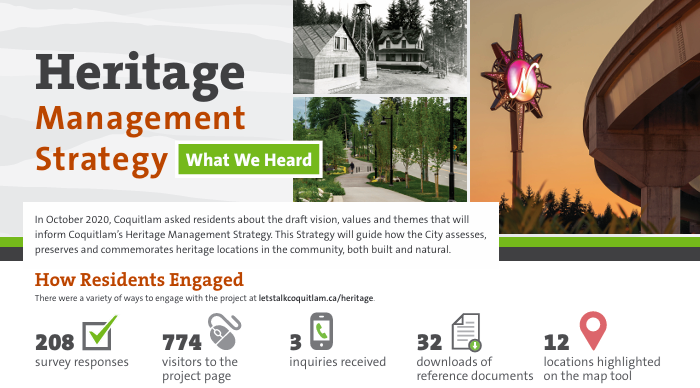The City of Coquitlam is crafting a bold new vision for heritage preservation through its Heritage Management Strategy (HMS)—a far-reaching initiative designed to identify, protect, and celebrate the city’s rich cultural, architectural, and natural history. With deep roots in Indigenous legacy, European settlement, and industrial transformation, Coquitlam’s identity is multifaceted, and the HMS aims to ensure that its diverse stories are not only remembered, but actively woven into the city’s ongoing development.
A Broader Definition of Heritage
Unlike traditional heritage efforts that focus solely on preserving old buildings, Coquitlam’s HMS takes an expansive view of what heritage means. It embraces tangible elements such as historic structures, landscapes, and artifacts, as well as intangible aspects like oral histories, community identity, and cultural traditions.
Sites like Mackin House, Ryan House, and the Fraser Mills Train Station represent physical remnants of Coquitlam’s past. Yet the strategy also seeks to protect and promote Indigenous traditions, the stories of immigrant communities, and natural features like salmon-bearing streams and mountain backdrops that shape the local sense of place.
Thematic Framework: A Contemporary Approach
At the core of the HMS is a thematic framework, a best-practice tool in heritage planning across Canada. Rather than simply cataloguing sites, this framework organizes heritage by key themes that reflect how Coquitlam has evolved over time. These include:
Uplands to Lowlands: The role of natural geography, from rivers to mountains.
Regional Nucleus: The city’s growth as a hub for government, education, and healthcare.
Diverse Landscape, Diverse People: The multicultural fabric of local communities.
Sustenance Economy to Commercial Centre: Economic transitions from farming and mills to modern commerce.
Natural/Cultural Convergence: Parks, events, and everyday life where nature meets culture.
Canoe Route to SkyTrain: The evolution of transportation infrastructure.
Evolving Community Identity: The ongoing formation of local identity through culture and achievements.
These themes were tested through public engagement in Fall 2020, with strong support from respondents who felt they captured the essence of Coquitlam’s heritage. Feedback emphasized the importance of protecting natural areas and recognizing the kʷikʷəƛ̓əm (Kwikwetlem) First Nation’s foundational role.
A Rich History of Heritage Work
Coquitlam’s heritage efforts aren’t new. The city’s involvement began in earnest with the 1986 Heritage Maillardville project, which surveyed over 75 heritage properties. By 1989, six landmark buildings were designated as Municipal Heritage Sites. Over the years, inventories expanded to include Riverview Hospital, Minnekhada Lodge, and Colony Farms, though many remain under the stewardship of other levels of government or require further planning for long-term conservation.
Despite progress, challenges remained—especially around lack of funding, limited public awareness, and concerns about private property rights. The 2001 Strategic Plan acknowledged these issues and recommended more comprehensive strategies, many of which are now being addressed through the HMS.
A Community-Centric Development Process
The HMS is being developed through a four-phase process involving deep public consultation, background research, and policy refinement. After initial engagement in 2020, the strategy has undergone revisions and was expected to reach Council in 2023 for formal review and adoption. Key partners in the process include:
City departments such as Planning, Parks, and Cultural Services.
The Heritage Advisory Committee and Coquitlam Heritage Society, which play roles in education, inventory, and site management.
The Kwikwetlem First Nation, ensuring Indigenous perspectives are respected and represented.
The city has also integrated feedback through online surveys, interactive maps, and direct consultation, gathering over 200 responses and engaging hundreds more through its Let’s Talk Coquitlam platform.
Tools for Protection and Incentives
Coquitlam’s HMS will deploy a variety of heritage conservation tools, many of which are grounded in provincial legislation. These include:
Heritage Revitalization Agreements (HRAs): Flexible tools that allow site-specific deals with property owners in exchange for conservation.
A Heritage Register: Official listing of significant properties that can benefit from incentives.
Design guidelines and zoning variations: To encourage preservation in redevelopment.
Financial incentives: Grants, tax relief, and other supports may be developed to aid private owners in maintaining heritage assets.
Also proposed are education campaigns, interpretive programs, school partnerships, and walking tours—all designed to foster greater community awareness and appreciation.
Looking Forward: Coquitlam’s Evolving Story
As Coquitlam continues to grow and evolve, the HMS provides a critical blueprint for balancing development with preservation. By framing heritage as a living part of community life—rather than a relic of the past—the City hopes to inspire broader participation in recognizing and protecting what makes Coquitlam unique.
Curious how heritage initiatives like this could shape your neighbourhood’s future? Whether you live near the trails of Minnekhada or a historic street in Maillardville, we’re watching these developments closely—because understanding the past is key to planning wisely for tomorrow. Want to stay informed? Let’s talk.

Comments:
Post Your Comment: